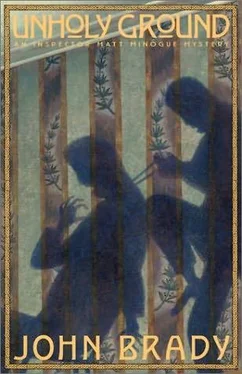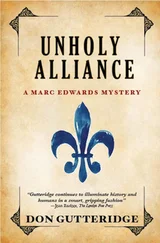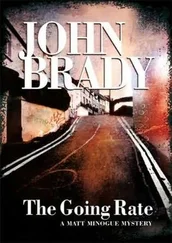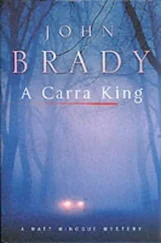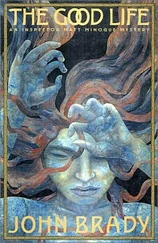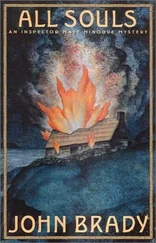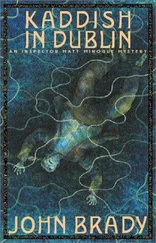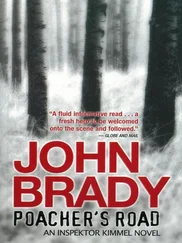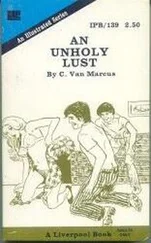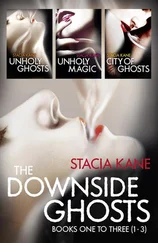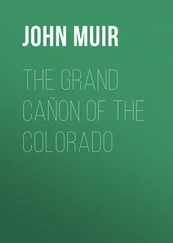John Brady - Unholy Ground
Здесь есть возможность читать онлайн «John Brady - Unholy Ground» весь текст электронной книги совершенно бесплатно (целиком полную версию без сокращений). В некоторых случаях можно слушать аудио, скачать через торрент в формате fb2 и присутствует краткое содержание. Жанр: Полицейский детектив, на английском языке. Описание произведения, (предисловие) а так же отзывы посетителей доступны на портале библиотеки ЛибКат.
- Название:Unholy Ground
- Автор:
- Жанр:
- Год:неизвестен
- ISBN:нет данных
- Рейтинг книги:5 / 5. Голосов: 1
-
Избранное:Добавить в избранное
- Отзывы:
-
Ваша оценка:
- 100
- 1
- 2
- 3
- 4
- 5
Unholy Ground: краткое содержание, описание и аннотация
Предлагаем к чтению аннотацию, описание, краткое содержание или предисловие (зависит от того, что написал сам автор книги «Unholy Ground»). Если вы не нашли необходимую информацию о книге — напишите в комментариях, мы постараемся отыскать её.
Unholy Ground — читать онлайн бесплатно полную книгу (весь текст) целиком
Ниже представлен текст книги, разбитый по страницам. Система сохранения места последней прочитанной страницы, позволяет с удобством читать онлайн бесплатно книгу «Unholy Ground», без необходимости каждый раз заново искать на чём Вы остановились. Поставьте закладку, и сможете в любой момент перейти на страницу, на которой закончили чтение.
Интервал:
Закладка:
He was dimly aware of a threat lurking somewhere. It was contiguous with, but also hidden by his own anger and alarm. Back in his office, Kenyon listed plusses and minuses on a sheet of paper. Then he sat back in the chair and waited for the issues to announce themselves.
The first thing Hugh Robertson, the Director of his section, would ask him would be if he was being as objective as he could be. No, maybe he'd ask if Kenyon wasn't overly sensitive in the atmosphere of publicity around the Service's operations. As for the objectivity question, Kenyon had to point out that there was too big a gap between what Murray was saying and what he himself was beginning to conclude about Arthur Combs. The Combs that Kenyon had read was still a younger man, rebellious and steely. Evaluation, objective evaluation, Kenyon echoed as he sat back in his chair.
He unlocked his desk and removed a sheet from the top drawer. The sheet contained a list of names. Seven of the fifteen people whose names he had gleaned from Combs' file in the Registry were dead. Of the remaining eight only two were British. One of those two lived in Spain. None of these people was under seventy. As far as Kenyon knew, none on the list had any connections with security or intelligence organisations. Combs had been fluent in German, of course. Probably bits of Greek and Spanish, definitely French. So? Kenyon almost said aloud.
Another possibility was local to where he had lived, near Dublin. Unlikely, he whispered aloud. Combs had resisted going there in the first place. Garrulous people, "the world's best grudge-keepers" had been quoted directly from an interview with Combs. Funny, but macabre now.
Kenyon buzzed Bowers and sent him out for two cheese croissants. Then he stood by the window, not needing the paper or lists to command the issues now. Just before Bowers' return, Kenyon was brooding about the perennial injustice of other people's chickens coming home to roost with him. Injustice indeed: Combs would have known about that. Kenyon swore aloud at the impossible logistics he'd have to outline if he was going to go through with this operation.
All at once Kenyon realised that if he was already thinking details, it meant that he had made a decision. He had assented to a plan, but he hadn't quite admitted it to himself yet. He'd stick with that decision. This insight provided a moment of relief, but when Bowers knocked, Kenyon was again worrying about an important detail he might have missed. Christ, there had to be someone significant in Combs' life. His family was gone years ago; there had to be someone he'd trust.
"Sir."
Bowers pushed the door open. Kenyon turned and glanced at the doctorate in political science who was five months into working for the greater good of the United Kingdom. Bowers' glasses reminded Kenyon of Carl Jung. Sex, anyone? No thanks. Bowers/Jung might reply, I must go for a bracing walk in the Alps.
"Good. Still hot? Would you phone the Director's secretary, Gillian, and set up a meeting with him. ASAP. Tell her I can go meet him if he's out, all right?" spacebarthing
Murray taxied to Knightsbridge. The telephone booth next to Mappins was empty. He stepped in and checked for a diartone. Hearing one, he looked at his watch. Two minutes to one. A woman struggling with shopping bags stopped outside the booth and opened her purse for change. Murray stuck his head out the door.
"The phone's broken, I'm afraid. I'm just trying to get my money back out of the stupid thing."
The shopper blinked at the well-groomed man leaning out of the door. She shrugged resignedly and took up her bags again. The phone rang a minute early.
"All right," Murray began. "Five has launched an investigation."
"I understand," said Ball slowly. Murray heard traffic from some Dublin street.
"Hold on a minute," Ball muttered. "I have to plug more money in already…"
Murray listened impatiently as the coins rang into the telephone.
"I had a meeting with Five's man. He thinks our friend may have done something underhand. Wrote a bloody memoir. Left some documents, or told someone. They'll want you for a debriefing, too," said Murray. "And I expect they'll do a sweep of the house, too," he added.
"I'm ninety-nine percent sure the place is clean. There was nothing."
"They'll be thorough," Murray replied. "They're very tender about the border security conference here. Everybody's edgy."
Ball read the rebuke between Murray's words. Couldn't have come at a worse time… was there no better way to fix it? Ball said nothing.
"What exactly did he say to you when he called you on Thursday?" asked Murray.
"He phoned me at the embassy. I met him in a pub that afternoon. He'd been drinking-"
"But did he say how he'd do it?" Murray interrupted. "What did he say he could do? What would he use?"
Ball paused before answering. This was his third time trying to reassure Murray.
"He said he wanted out and that we had better listen to him this time around. I got him calmed down. He didn't say how but that he'd see to it somehow-"
"Somehow," Murray repeated. "Somehow."
"Exactly. He thought we had his mail opened and that we knew when he went to the toilet. He had no real plan, nothing. He went off at half-cock, without thinking it out. He said I should 'walk the plank' for it. You too."
"He didn't know me," Murray said quickly.
"I know. More bluff. He only met you once. He called you'the ringleader.' How do you like that title?"
Murray did not care for Ball's grim humour one bit. There was a taunting edge to it: Ball, the action-man, chiding Murray, the desk-man. Murray thought back to the meeting in a seedy Dublin hotel. Combs had already been into his second-or was it third? — Scotch minutes after the hotel bar had opened, looking sullenly from Ball to Murray, hardly bothering to conceal his hostility.
"But he had no inkling after you met him Thursday? That we wouldn't buy, I mean?"
"Right." Ball said sharply. "I got him calmed down and I gave him what he wanted. I told him it would take a couple of days to get the passport through, so it'd be Monday at the earliest. But that we'd hurry things up…"
"Yes," said Murray, distracted yet.
"… Stroked his hand, cooed his ear about the work he had done. I sent him home happy. At least more sober than when he arrived at the pub. I told him we had been about to wrap the whole thing up soon."
"You're certain he wasn't specific even then?"
"Absolutely. He didn't say what he would do, or would have done. That's because he didn't have anything prepared," Ball added slowly for emphasis.
Except his instincts, Murray almost added aloud. Kenyon's reading of the Combs' material… Would Combs have suspected something from the way Ball had behaved at that meeting, that he'd never be let go knowing what he knew? Was Combs really the boozy, truculent character that Ball had been dealing with, or had Kenyon scented something more basic in his make-up?
"All right," Murray said finally, staying his own wandering. "Expect to be called in about Combs."
Murray hung up and hailed a taxi. He tried to ignore the garrulous Cockney cabbie. Ball was experienced, dependable. His motivation was at least as high as Murray's own. Mervyn Ball had dealt with Combs for two years, babysitting him, humouring him-his had to be the more accurate assessment. Most of all, Ball had not flinched, even when Murray himself had thought it precipitate to silence the old man.
The taxi joined a traffic jam near Oxford Circus. The cabbie's eyes sought out Murray in the mirror.
"Bloody bomb scare, I shouldn't wonder," said the Cockney. "Who's it this time, I wonder? The bloody Arabs or the Irish, eh?"
Murray ignored the question. Combs' "Somehow": it was very telling, all right. A loose threat, stillborn. He wondered if Ball had felt much pity for the old man. Hardly. Ball had been tough from the start. Perhaps not tough-more like firm, uncompromising-but still able to coax the old man. Did Combs wonder how Ball could cave in so readily to his demand last Thursday, though? Combs might have sobered up and then wondered why, after years of the cold shoulder, he was suddenly being granted what he had been asking for at least thirty years…
Читать дальшеИнтервал:
Закладка:
Похожие книги на «Unholy Ground»
Представляем Вашему вниманию похожие книги на «Unholy Ground» списком для выбора. Мы отобрали схожую по названию и смыслу литературу в надежде предоставить читателям больше вариантов отыскать новые, интересные, ещё непрочитанные произведения.
Обсуждение, отзывы о книге «Unholy Ground» и просто собственные мнения читателей. Оставьте ваши комментарии, напишите, что Вы думаете о произведении, его смысле или главных героях. Укажите что конкретно понравилось, а что нет, и почему Вы так считаете.
